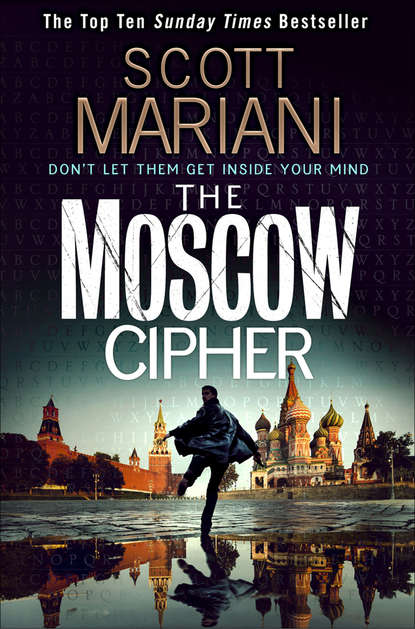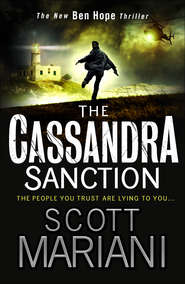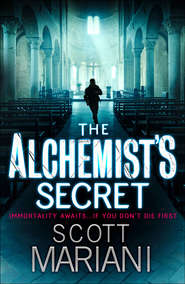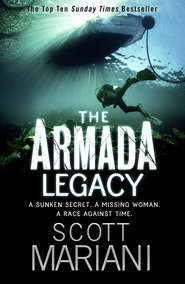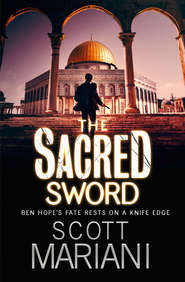По всем вопросам обращайтесь на: info@litportal.ru
(©) 2003-2024.
✖
The Moscow Cipher
Автор
Год написания книги
2019
Настройки чтения
Размер шрифта
Высота строк
Поля
Yuri had no idea of what he was about to step into.
The agents stopped outside an unmarked door. ‘Go in,’ one said to Yuri.
Yuri did as he was told. He found himself in an office, not a cosy one. The walls and steel filing cabinets and ancient iron radiators and exposed pipes were all painted the same grey as the corridor. There was no carpet and only one window, through whose dusty glass little sunlight was able to penetrate. In front of the window was a large, plain desk, which was completely bare except for a telephone and a slim cardboard folder that lay closed on the desktop.
Behind the desk sat a man whom Yuri, unlike the men who had brought him here, did in fact recognise. It was his former chief, the man who had first interviewed and employed him in the service, Antonin Bezukhov.
The chief was a large, heavyset figure in a dark suit. His white hair was buzzed military-short and his face appeared to have been chiselled from a lump of granite. He had to be in his mid-seventies, but if anything he looked more severe and intimidating than Yuri remembered, which was saying something. This was a man rumoured to have personally executed several CIA operatives, back in the glory days of the Cold War. As far as Bezukhov was concerned, the old regime had never ended.
Bezukhov invited him to sit, and offered him a ghost of a smile. ‘You’re a hard man to find, Yuri. We obviously trained you too well. Where’ve you been hiding yourself these days?’
Yuri swallowed. ‘Why am I here? What do you want from me?’
‘We need you to come back and work for us, one more time,’ said Bezukhov.
‘But I’m retired,’ Yuri protested. ‘Out, gone, done with the whole thing. I don’t want anything more to do with any of it.’
‘Consider this your heroic comeback,’ the chief said, faintly amused. ‘Come on, Yuri, don’t you know that once you’re in the club, we’d never really let you go? That’s how the game is played, my friend. And now we have another job for you.’
Yuri could find nothing to say. Bezukhov reached a thick arm across the desk, and a brawny paw of a hand slid the solitary card folder over its surface towards Yuri. ‘Open it.’
Again, Yuri did as he was told. Inside the card folder was a transparent plastic sleeve, and inside that a single oblong slip of paper. It was heavily aged, as if it had spent many years exposed to the elements. And creased, as though it had been folded up very small throughout that time. Long ago, someone had written four lines of text on the paper, using black ink that had faded somewhat but was still clearly legible. The writing wasn’t in Russian. It used the letters of the English alphabet, though the language wasn’t English either.
‘It’s a cipher,’ Yuri said. An old one, too, dating back a good few decades. Seeing it, he couldn’t pretend not to feel a slight stirring of curiosity.
‘Good to see you haven’t lost your powers of observation, Agent Petrov.’
‘Please don’t call me that.’
‘This cipher is the reason I called you in,’ the chief said. ‘You’re going to decode it for us. Just like old times.’
Yuri studied the cipher more closely. Right away, he could tell it was like no other code he’d come across before. Even back in the pre-cybertechnology dark ages, cryptology had reached a level that was far from crude. ‘It’s not going to be easy.’
‘Why do you think we selected you for the task?’ the chief said. ‘Some people haven’t forgotten you used to have a way with these things, back in the old days before these fucking computers took over.’ He spat out the expletive with surprising bitterness.
As Yuri went on peering at the encrypted text, the chief recomposed himself and explained, ‘The cipher was discovered two weeks ago by a crew of workmen who were demolishing a block of old post-war houses in Novogireyevo District. Coming across an envelope that had been crammed into a crack in a wall, they opened it, saw it was something peculiar and handed it in to the police. Thank God for patriotism, heh?’
Yuri asked, ‘What was it doing there?’
Bezukhov smiled, aware that Yuri was being drawn in despite himself. ‘We believe that it was concealed there in February 1957 by a British spy working as part of a network. His cover ID was Pyotr Kozlov, real name Leonard Ingram, a British Army captain recruited to SIS after the war. He and a couple of others were inserted into the Soviet Union that January, as part of a special operation you don’t need to know about. Let’s just say they were stealing secrets. That was before the Anti-Fascist Protection Rampart was put up, and these shits could creep in and out almost as they pleased.’ This was all long, long before Yuri’s time, but he knew the chief was talking about the Berlin Wall.
Bezukhov levered himself from his chair and went to gaze out of the dusty window. With his back to Yuri he went on, ‘Of course, our boys were onto them the moment they stepped on Russian soil. And we had our suspicions about what they were up to. The cipher is obviously a set of instructions of some kind, which would indicate the nature of the secrets they stole, and their whereabouts. Ingram was on his way to pass those instructions to one of his fellow spies when the KGB jumped the gun and nabbed him too soon. If they’d allowed the meeting to take place, they could have captured both of them together as well as the information they were sharing.’ Bezukhov turned away from the window with a sigh. ‘Mistakes happen. Anyway, when he knew they were closing in on him, Ingram managed to hide what he was carrying, presumably intending to return there if by some miracle he escaped.’
‘But he didn’t.’
Bezukhov shook his head. ‘Before he knew it, he was carted off to Lubyanka for interrogation. Sadly for us, however, the clumsy fools who worked him over were a little overenthusiastic with their use of force. He expired before they were able to get much out of him.’
Yuri felt sick. He tried not to visualise the scene too vividly, but couldn’t shut off his imagination.
‘Before he died,’ the chief went on, ‘he revealed knowledge of some highly sensitive information. And I do mean highly,’ he repeated for emphasis. ‘We want to recover that information, and we believe the cipher is key to understanding how much he knew, who else might have been passed that information and how much damage might have been done to our security.’
‘So long ago,’ Yuri said, frowning. ‘How could it still be important?’
‘The biggest secrets are like plutonium,’ Bezukhov replied. ‘Their potency doesn’t fade over time.’
The chief let those words hang in the air for a moment, then yanked open a drawer of his desk. ‘As you probably know, the old KGB archives on dissidents and enemy spies detained during the Cold War were never destroyed after the fall of the Soviet regime. They were simply hustled away to a new location and now reside inside a high-security underground vault, one to which I happen to have access. I’ve examined the contents of Ingram’s file and found something that may be of value to us. Ingram was carrying these items the night he was captured.’
Bezukhov took a packet from the drawer and slid it across the desk towards Yuri. Yuri hesitated, looked inside, then glanced quizzically up at the chief.
‘Tuning forks,’ Bezukhov said. ‘Part of his cover. Never mind those. It’s the book I’m interested in.’
The paperback was an old mid-fifties edition of Lucky Jim by the English novelist Kingsley Amis, yellowed by decades spent in secret government storage.
‘Certain pages of the book appear to have been very well thumbed,’ Bezukhov said. ‘You know what that means.’
Yuri did indeed. Old-fashioned ciphers often made use of random phrases and passages from books, likewise chosen at random and known only to the codemaker and the codebreaker. Without the book, it could be literally impossible to decipher the encrypted message. Yuri shook his head. What a fool the British spy had been, to be caught with it. A basic error of tradecraft, one that had cost him dear. Needless to say, Russian agents didn’t make such mistakes.
‘Get to work,’ Bezukhov said. ‘I expect results, Agent Petrov, and I expect them soon. And for pity’s sake, get a shave and a haircut. You look like one of the beatniks we used to send to the Gulag.’
Chapter 3 (#ue105cd42-113a-5e86-a4b2-f124c0f01acf)
Yuri returned to his dingy apartment, his nerves rattled by the idea that the intelligence services could just scoop him up and put him back to work like he was one of their mindless, unquestioning drones. But what choice had he, other than to do their bidding?
And if he was perfectly honest with himself, a tiny part of him was thrilled to be working on the cipher. For so long, he had lacked any sense of purpose. This was the stuff he did best, and he was determined to crack it. Not just to please Bezukhov, but to prove to himself that he still had what it took.
First impressions had been right: the cipher was indeed like nothing else he’d encountered before. It was like a modern-day locksmith suddenly faced with picking some antiquated and fiendishly complex device from ancient China or Egypt. Yuri carried it over to the cluttered work table in the corner of his tiny living room. With a cup of coffee at his right elbow, Ingram’s copy of Lucky Jim at his left and the cipher, notepad, pen and his trusty laptop in front of him, he got down to his task with an energy he’d forgotten he had. The laptop was loaded with a decryption program he’d designed himself, called CAESAR. But, just like in the good old days, technology would be no substitute for sheer brainwork. Man, not machine, would be doing most of the heavy lifting.
The thing was a modified Polybius square with straddling bipartite monoalphabetic substitution, superenciphered by double transposition. In short, it was a tough little bastard to crack. Without the yellowed, dog-eared old book, he’d have been lost. Somewhere within its pages was the key to whatever message the British spy had been trying to pass to his colleagues. He was damned if he couldn’t find it.
Yuri worked all night. And all of the next day. And all of the following night as well. He worked until he was exhausted, skipping meals, snoozing for short periods at the desk, reluctant to leave his chair even for toilet breaks. He worked until the whole room was littered with screwed-up sheets of paper covered in gobbledegook.
But he got it. Finally, as the first streaks of dawn were breaking on the third day, with just a little help from CAESAR, he got it.
When the computer finally spat out the finished decryption, Yuri fell back in his chair and stared at the screen for a long time. The decoded message was short. The bottom lines were a set of geo coordinates. The top line consisted of just five words, in English. OPERATION PUPPET MASTER IS REAL.
Those five words couldn’t have hit Yuri harder if they had been bullets fired from a high-powered rifle.
‘Operation Puppet Master’ was the translation of the Russian ‘Oперaция кукольныи мaстер’, and one of the great mythical beasts in the pantheon of conspiracy theory dating back to Cold War times. On internet forums and all across the blogosphere, debate still raged among paranoid nutjobs and serious investigators alike over whether the highly classified Soviet project had ever been more than a wild fantasy. He and Grisha had talked about it often. While Grisha was an avid believer, of course, Yuri had been privately sceptical: file under ‘Giant Alien Lizards’.
Suddenly that scepticism had been blown to smithereens. ‘You’ve got to be fucking kidding me,’ he breathed.
The bastards had actually been developing this stuff all along? It was real?
Not only real, but worrying enough, apparently, to have drawn the attention of SIS, the British Intelligence Service, precursor to MI6, so long ago. Enough of a threat for the likes of Captain Leonard Ingram to risk and lose his life over. Things didn’t get more real than that.
Yuri fed the geo coordinates into Google and discovered that they pointed to a location right here, in Moscow. It was obvious what he had to do next.
Yuri’s car was an ancient Volkswagen that wheezed and rattled and grew lighter each year as more parts dropped off. Traffic was mercifully sparse at that time of morning, and the banger was able to reach its destination without expiring. The area was in the east of the city, part of the Novogireyevo district where the KGB had apprehended the British spy back in ’57. The coordinates led Yuri to a fenced-off row of old Soviet-era warehouses that must have been disused even then, now decades overdue for demolition.





